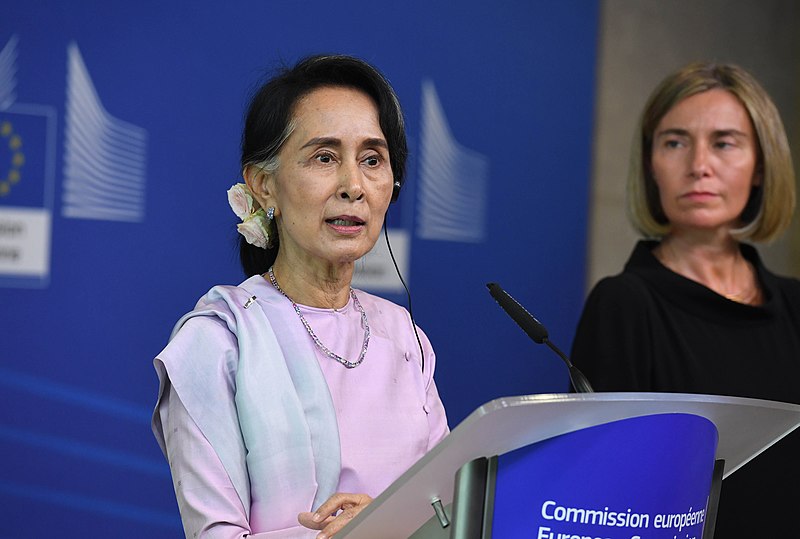The junta-backed court in Myanmar handed more prison time to ousted leader Aung San Suu Kyi this week. Suu Kyi was sentenced to an additional three years imprisonment on corruption charges.
A military court on Wednesday sentenced Suu Kyi to an additional three years in prison, finding the ousted leader guilty of two counts of corruption. The sentences would run concurrently, and Suu Kyi is now sentenced to serve a total of 26 years in prison. Suu Kyi has denied any wrongdoing, calling the charges levied against her by the junta absurd.
Suu Kyi is still on trial for five more charges of corruption.
Tony Cheng of Al Jazeera said the corruption charges against Suu Kyi were made by a businessman who has previously gotten into trouble with authorities in the past.
“He said he visited her house on a number of occasions. Left parcels wrapped in black paper with sums ranging between $100 and $150,000 US dollars for her in return for preferential treatment in government tenders his company had made,” said Cheng.
“Those accusations were actually broadcast live on Myanmar TV after the coup. He himself is a rather dubious witness or witness of questionable quality. He’s previously served prison terms for drug possession. Nonetheless, she was found guilty on both charges today,” said Cheng.
Cheung added that the court verdicts and sentences were aimed at completely removing Suu Kyi from the country’s political scene. Critics of the junta have long alleged that the charges against the ousted leader were to remove her from politics and to prevent her from returning to politics again or trying to challenge the military’s hold on power.
Hundreds were killed and thousands were detained by the junta when the generals staged a coup to oust the elected government in February last year. Fighting has reportedly resumed again in the area of Rakhine where the Rohingya Muslim minority was driven out in 2017 in a crackdown denounced as genocide and is the subject of an ongoing trial.
The Arakan Army, also known as AA, the rebel militant group looking to take more control of Rakhine, and its political wing the United League of Arakan looked to extend its power in Rakhine following the coup, is now being suspected by the generals as having ties to coup opponents.



 U.S. Lawmakers to Review Unredacted Jeffrey Epstein DOJ Files Starting Monday
U.S. Lawmakers to Review Unredacted Jeffrey Epstein DOJ Files Starting Monday  Trump Signs Executive Order Threatening 25% Tariffs on Countries Trading With Iran
Trump Signs Executive Order Threatening 25% Tariffs on Countries Trading With Iran  U.S.-India Trade Framework Signals Major Shift in Tariffs, Energy, and Supply Chains
U.S.-India Trade Framework Signals Major Shift in Tariffs, Energy, and Supply Chains  Missouri Judge Dismisses Lawsuit Challenging Starbucks’ Diversity and Inclusion Policies
Missouri Judge Dismisses Lawsuit Challenging Starbucks’ Diversity and Inclusion Policies  Trump’s Inflation Claims Clash With Voters’ Cost-of-Living Reality
Trump’s Inflation Claims Clash With Voters’ Cost-of-Living Reality  Trump Allows Commercial Fishing in Protected New England Waters
Trump Allows Commercial Fishing in Protected New England Waters  South Korea Assures U.S. on Trade Deal Commitments Amid Tariff Concerns
South Korea Assures U.S. on Trade Deal Commitments Amid Tariff Concerns  Ohio Man Indicted for Alleged Threat Against Vice President JD Vance, Faces Additional Federal Charges
Ohio Man Indicted for Alleged Threat Against Vice President JD Vance, Faces Additional Federal Charges  US Pushes Ukraine-Russia Peace Talks Before Summer Amid Escalating Attacks
US Pushes Ukraine-Russia Peace Talks Before Summer Amid Escalating Attacks  Trump Backs Nexstar–Tegna Merger Amid Shifting U.S. Media Landscape
Trump Backs Nexstar–Tegna Merger Amid Shifting U.S. Media Landscape  U.S. Announces Additional $6 Million in Humanitarian Aid to Cuba Amid Oil Sanctions and Fuel Shortages
U.S. Announces Additional $6 Million in Humanitarian Aid to Cuba Amid Oil Sanctions and Fuel Shortages  Netanyahu to Meet Trump in Washington as Iran Nuclear Talks Intensify
Netanyahu to Meet Trump in Washington as Iran Nuclear Talks Intensify  India–U.S. Interim Trade Pact Cuts Auto Tariffs but Leaves Tesla Out
India–U.S. Interim Trade Pact Cuts Auto Tariffs but Leaves Tesla Out  China Warns US Arms Sales to Taiwan Could Disrupt Trump’s Planned Visit
China Warns US Arms Sales to Taiwan Could Disrupt Trump’s Planned Visit  Trump Lifts 25% Tariff on Indian Goods in Strategic U.S.–India Trade and Energy Deal
Trump Lifts 25% Tariff on Indian Goods in Strategic U.S.–India Trade and Energy Deal  Federal Judge Restores Funding for Gateway Rail Tunnel Project
Federal Judge Restores Funding for Gateway Rail Tunnel Project  Pentagon Ends Military Education Programs With Harvard University
Pentagon Ends Military Education Programs With Harvard University 































